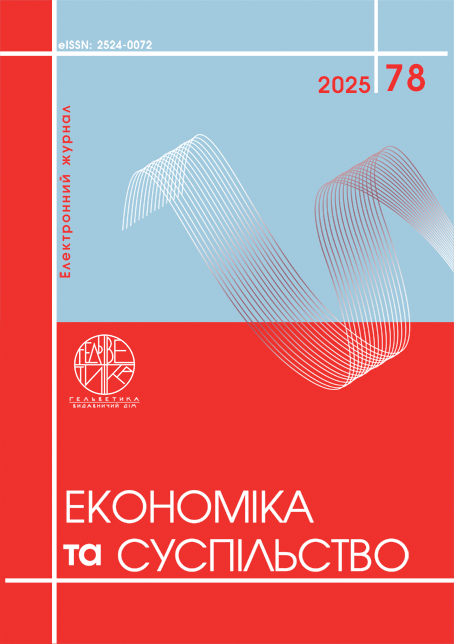TRANSFORMATION OF BUSINESS PROCESSES UNDER THE DIGITALIZATION’S INFLUENCE IN THE TRANSITIONAL PERIOD CONTEXT FROM INDUSTRY 4.0 TO INDUSTRY 5.0
Abstract
The article explores the transformation of Ukrainian enterprises from Industry 4.0 to Industry 5.0, emphasizing the progressive digitalization of business processes and the deep integration of advanced technologies into production and management. The implementation of ERP, CRM, BI, RPA, and cloud platforms has formed a stable digital core that ensures operational sustainability, transparency, and continuity of business functions even under volatile external conditions. Evolutionary technologies such as artificial intelligence, generative algorithms, augmented and virtual reality, blockchain systems, digital twins, and quantum computing are enhancing efficiency, adaptability, forecasting accuracy, and strategic decision-making capacities across industries. Particular attention is devoted to the synergy between machine intelligence and human creativity, as well as the increasing involvement of employees in strategic, analytical, and creative activities that strengthen innovation potential. The study substantiates the theoretical foundations of the transition to Industry 5.0 and provides methodological guidelines for enterprise management in the context of rapid technological and socio-economic transformation. It also highlights the paradigm shift from automation-centric to human-centric development models, where digital tools enhance sustainable production, intelligent collaboration, and social value creation. The article underscores the growing importance of resilience, ethical use of artificial intelligence, and cross-sectoral cooperation as essential pillars of Industry 5.0 maturity. Furthermore, a conceptual framework is proposed to help enterprises develop balanced innovation strategies that align technological modernization with human capital growth, environmental responsibility, and long-term competitiveness. The findings contribute to a better understanding of how Ukrainian companies can effectively leverage digital intelligence and hybrid human–machine systems to achieve sustainable performance, adaptability to change, and inclusive growth within the emerging Industry 5.0 landscape.
References
Нечипорук Л. В., Кочергіна О. Цифрова економіка та економічна безпека. Науково-практичний журнал. 2024. № 5(14). С. 27–32. DOI: https://doi.org/10.32782/dees.14-4 (дата звернення: 28.08.2025)
Пілюков А. О. Трансформація методологічних підходів до проєктного менеджменту відповідно до концепції Індустрія 5.0. Економічний вісник НТУУ «КПІ»: збірник наукових праць. 2024. № 29. С. 144–151.
Красношапка А., Фокіна-Мезенцева К. Характеристика та аналіз особливостей трансформації від Індустрії 4.0 до Індустрії 5.0 та Суспільства 5.0. Молодий вчений. 2025. № 1(132). С. 177–183. DOI: https://doi.org/10.32839/2304-5809/2025-1-132-8 (дата звернення: 28.08.2025)
Гринюк О. І. Цифрова трансформація суб’єктів господарювання у контексті концепції Індустрії 4.0: сучасні тенденції, бар’єри та ризики впровадження. Ефективна економіка. 2021. № 5. DOI: https://doi.org/10.32702/2307-2105-2021.5.97 (дата звернення: 28.08.2025)
Гуцуляк В. Р., Гуцуляк В. М. Основні ризики Індустрії 4.0 для підприємств у сучасних умовах розвитку. Проблеми системного підходу в економіці. 2021. № 1(87). С. 49–53. DOI: https://doi.org/10.32782/2520-2200/2022-1-7 (дата звернення: 28.08.2025)
Брюховецька Н. Інтелектуалізація як пріоритетний напрям розвитку промислового підприємства в умовах Індустрії 4.0. Економіка промисловості. 2019. Т. 4, № 88. С. 28–57. DOI: https://doi.org/10.15407/econindustry2019.04.028 (дата звернення: 28.08.2025)
Скоробогатова Н. Є. Концептуальні засади формування сталого розвитку суспільства в контексті індустрії 4.0. Економічний вісник НТУУ «КПІ». 2019. № 16. DOI: https://doi.org/10.20535/2307-5651.16.2019.182748 (дата звернення: 28.08.2025).
Трофименко О., Богданова Л., Володіна А. Регулювання молодіжного сегменту ринку праці на засадах восьмої цілі сталого розвитку в умовах Індустрії 4.0. Економічний аналіз. 2021. Т. 31. № 1.
Kagermann H., Wahlster W., Helbig J. Recommendations for Implementing the Strategic Initiative INDUSTRIE 4.0. 2013. 678 p.
Lüker J., Beaver J., Greenfield J. Towards an Industrie 4.0 environment. In Proceedings of the 23rd Americas Conference on Information Systems (AMCIS 2017). 2017.
Nechyporuk L. V., Kochergina O. (2024) Tsyfrova ekonomika ta ekonomichna bezpeka [Digital Economy and Economic Security]. Naukovopraktychnyi zhurnal – Scientific and Practical Journal, no. 5(14), pp. 27–32. DOI: https://doi.org/10.32782/dees.14-4 (accessed August 28, 2025)
Pilyukov A. O. (2024) Transformatsiia metodolohichnykh pidkhodiv do proiektnoho menedzhmentu vidpovidno do kontseptsii Industriia 5.0 [Transformation of Methodological Approaches to Project Management According to the Industry 5.0 Concept]. Ekonomichnyi visnyk NTUU “KPI”: zbirnyk naukovykh prats, no. 29, pp. 144–151.
Krasnoshapka A., Fokina-Mezentseva K. (2025) Kharakterystyka ta analiz osoblyvostei transformatsii vid Industrii 4.0 do Industrii 5.0 ta Suspilstva 5.0 [Characteristics and Analysis of the Transformation from Industry 4.0 to Industry 5.0 and Society 5.0]. Molodyi vchenyi – Young Scientist, no. 1(132), pp. 177–183. DOI: https://doi.org/10.32839/2304-5809/2025-1-132-8 (accessed August 28, 2025)
Hryniuk O. I. (2021) Tsyfrova transformatsiia subiektiv hospodarjuvannia u konteksti kontseptsii Industrii 4.0: suchasni tendentsii, bar’ery ta ryzyky vprovadzhennia [Digital Transformation of Business Entities in the Context of the Industry 4.0 Concept: Current Trends, Barriers, and Implementation Risks]. Effektivna ekonomika – Effective Economy, no. 5. DOI: https://doi.org/10.32702/2307-2105-2021.5.97 (accessed August 28, 2025)
Hutsuliak V. R., Hutsuliak V. M. (2021) Osnovni ryzyky Industrii 4.0 dlia pidpryiemstv u suchasnykh umovakh rozvytku [Main Risks of Industry 4.0 for Enterprises in Modern Development Conditions]. Problemy systemnoho pidkhodu v ekonomitsi – Problems of the Systemic Approach in Economics, no. 1(87), pp. 49–53. DOI: https://doi.org/10.32782/2520-2200/2022-1-7 (accessed August 28, 2025)
Briukhovetska N. (2019) Intelektualizatsiia yak priorytetnyi napriam rozvytku promyslovoho pidpryiemstva v umovakh Industrii 4.0 [Intellectualization as a Priority Direction of Industrial Enterprise Development under Industry 4.0]. Ekonomika promyslovosti – Industrial Economy, vol. 4, no. 88, pp. 28–57. DOI: https://doi.org/10.15407/econindustry2019.04.028 (accessed August 28, 2025)
Skorobohatova N. E. (2019) Kontseptualni zasady formuvannia staloho rozvytku suspilstva v konteksti industrii 4.0 [Conceptual Principles of Sustainable Development Formation in the Context of Industry 4.0]. Ekonomichnyi visnyk NTUU “KPI” – Economic Bulletin of NTUU “KPI”, no. 16. DOI: https://doi.org/10.20535/2307-5651.16.2019.182748 (accessed August 28, 2025)
Trofymenko O., Bohdanova L., Volodina A. (2021) Rehuliaiia molodizhnoho segmentu rynku pratsi na zasadakh vosmoi tsili staloho rozvytku v umovakh Industrii 4.0 [Regulation of the Youth Labor Market Segment Based on the Eighth Sustainable Development Goal under Industry 4.0]. Ekonomichnyi analiz – Economic Analysis, vol. 31, no. 1.
Kagermann H., Wahlster W., Helbig J. (2013) Recommendations for Implementing the Strategic Initiative INDUSTRIE 4.0. 678 p.
Lüker J., Beaver J., Greenfield J. (2017) Towards an Industrie 4.0 environment. In: Proceedings of the 23rd Americas Conference on Information Systems (AMCIS 2017).

This work is licensed under a Creative Commons Attribution 4.0 International License.


